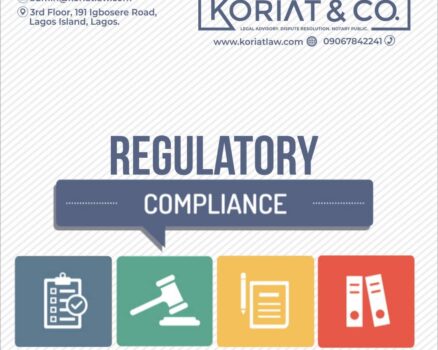Many small businesses, especially online entrepreneurs in Nigeria, are not (or do not have their businesses) registered with the Corporate Affairs Commission (CAC) despite being in business for a year or more. They conclude transactions using an unregistered “business” name but when it is time for payment by customers or clients, they receive payment with their personal bank accounts.
Please note that the non-registration of a business is a big disadvantage to its owners in many ways.
1. Business Expansion: At a particular point, every business will need to scale, even if it is through private equity. A business must be registered with the CAC to receive loan from many major investors or lenders. To expand your business, you may need investors to inject funds into the business and many investors usually insist on seeing corporate documents including certificate of incorporation and proof of regulatory license, amongst others.
2. Operational license: Apart from professional license which is grantable to individuals, a business license is usually granted to a registered business that meets stipulated requirements for the relevant license. Also, without proof of certificate of incorporation, application for a business license may not succeed.
Liability for Debts and other Civil Wrongs: Another important advantage of registration of company is that it limits the risk of its shareholders liability. It may be strange to non-lawyers to learn that if your company is registered, you may not be liable for the debt or other civil liabilities of the company except the to the extent of the number of shares taken or bought by you (the shareholder). This means when the company falls into debt, only its assets can be sold or managed to settle the debt; the assets of the company’s shareholders cannot be attached to settle such company’s debt.
A Boost to Entrepreneurial Drive: when a company is registered and its directors/shareholders are confident that the company has its own separate legal personality to bear rights and liabilities, this quite naturally boosts the morale and drive of those in charge to pursue maximum profit.
Branding Purpose: An incorporated business is better branded than unincorporated one.
What then are the requirements for registration of a company in Nigeria?
The following are the requirements for registration of a company in Nigeria:
1. Name of the Company: Two (2) proposed names for the company must be submitted to the Corporate Affairs Commission (“CAC”) for reservation. One of the names, if approved, will be reserved for sixty (60) days to enable the promoters to complete the registration before the reserved name expires. The cost of reservation of name is N500 (Five Hundred Naira). Usually, registration will likely be completed within 24 hours of submission;
2. Nature of Business: A skeletal description of the nature and sector of the company’s business is also required for incorporation of a company. An outline of the proposed business of the company needs to be set out to enable the CAC determine if the promoters need to provide qualifying certificates or not. Please not that some businesses, such as the financial sector, insurance, pension and oil sectors are heavily regulated and, sometimes, may require approval in principle from the regulator before CAC will approve the registration of any company seeking to do business in such sector.
3. Registered Address in Nigeria for the Company: promoter(s) seeking to register a company with CAC must have an address in Nigeria for the proposed company. Please note that the registered address is also necessary for tax purposes.
4. Shareholders: The list of shareholders must be provided during registration of a company. Please note that one (1) person can solely own a company in Nigeria. The old requirement that a company must have a minimum of two (2) shareholders has now been abolished. The shareholder’s names, contact and residential addresses, phone number, email address, occupation, electronic signature(s) and government-issued means of identification must be presented to CAC.
5. Issued Share Capital: This is the total amount of shares to be shared amongst the company’s shareholders. The amount of the company’s issued share capital must be stated clearly at incorporation. If your company is an SME, it is advised that the minimum issued share capital of a private company, which is N100,000, should be preferred. Although the minimum issued share capital of a public company is N2,000,000, it is expected that a startup will not immediately go public and therefore may be registered with N100,000 share capital. Please note also that you can exceed the share capital of 100,000,000 or 2,000,000 (or may be required by a regulatory guideline to register with a higher amount of share capital, depending on the sector).
6. Shareholding Structure: The share distribution amongst the founding shareholders must be clearly set out to know who gets what number of shares. The number of shares to be held by each shareholder must be stated. It may be useful if the shareholders have shareholders’ agreement to document their understanding regarding the rights of members.
7. Directors: The list of directors of the company must be provided. Please note that one (1) individual can solely run a company in Nigeria. The old requirement that a company must have a minimum of two (2) directors has now been abolished. The directors’ names, contact and residential addresses, phone number, email address, occupation, electronic signature(s) and government-issued means of identification must be presented to CAC.
8. Certificate of Proficiency: Where the proposed companies are set up to operate in some special sectors, the CAC may demand that the directors submit qualifying certificates showing their proficiency in that sector.
How much does it cost to register your company?
The cost of registration will depend on the amount of share capital. It is better to register your company with a small share capital of N100,000 unless the sector of its business requires a higher amount of share capital.
Please note also that the amount of share capital determines the costs of CAC incorporation and the applicable stamp duty chargeable by the Federal Inland Revenue Service (FIRS). For example, the total costs for incorporating a N100,000 share capital company (minus professional fees) is about N15,000 (Fifteen Thousand Naira), inclusive of CAC name reservation and registration charges, FIRS stamp duty, and Remita charges.




